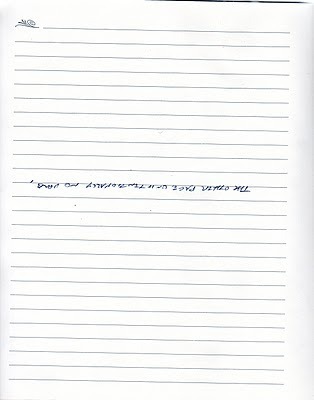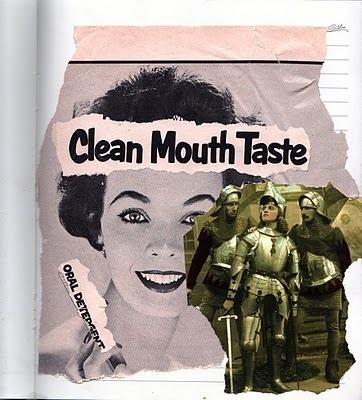Michael Swanwick's Blog, page 216
August 5, 2011
Reading Apollinaire's Bestiary
.
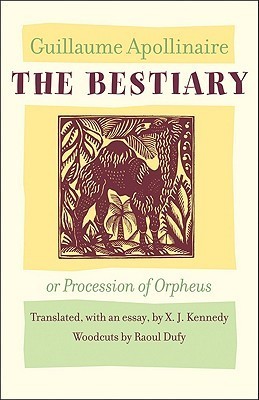
I do not argue that e-books will never replace the traditional book. The advantages of being able to throw a few hundred books into your overnight bag are pretty well established by now. Nor is it seemly for a man who makes a living from writing science fiction to wax overly nostalgic about the technologies of his youth.
But still. There is a particular pleasure to a well-made book, and here's a case in point. I am currently reading (and have been for some time) Guillaume Apollinaire's first collection of poems, The Bestiary: or Procession of Orpheus . I have a particular fondness for bestiaries and for collections of verse, so this was a natural for me. Also, I've never really gotten a handle on Apollinaire as a poet and I figured this was a good place to start.
The appeal of e-books seems to me chiefly one of efficiency. You conceive a desire for a particular book and in less time than it would take to find the keys and back the car out of the driveway, your purchase is complete. Rather than having to rattle through the house, searching through shelves and stacks of books, you simply boot up the reader and there the text is, at your fingertips. These are undeniably good things.
Sometimes, though, you don't want efficiency. The Bestiary is a collection of poems that are only four lines long. You could barrel through it in fifteen minutes if you were willing to sacrifice comprehension. And yet. The slim volume I have (from Johns Hopkins University Press) is designed for languorous reading. The pages are thick, cream-colored stock, a mild pleasure to touch, and they are of slightly staggered lengths, so that one opens it at random to find a small treasure awaiting: on the left-hand page, a single poem printed twice, first in the original French and then in English translation by X. J. Kennedy and on the right-hand page a woodcut by Raoul Dufy of the creature in question. It is a book that as good as says, I am a complete waste of your time. Come -- waste your time in my pleasant company.
It is when we are at our most inefficient that we enjoy life best. I don't know how much of the book I've read yet. But I'm sure that someday I'll pick it up and realize that I've read every poem it contains. X. J. Kennedy also provides an explanatory essay at the beginning and I may get around to reading that too, someday. Or maybe not, depending on my mood.
*

I do not argue that e-books will never replace the traditional book. The advantages of being able to throw a few hundred books into your overnight bag are pretty well established by now. Nor is it seemly for a man who makes a living from writing science fiction to wax overly nostalgic about the technologies of his youth.
But still. There is a particular pleasure to a well-made book, and here's a case in point. I am currently reading (and have been for some time) Guillaume Apollinaire's first collection of poems, The Bestiary: or Procession of Orpheus . I have a particular fondness for bestiaries and for collections of verse, so this was a natural for me. Also, I've never really gotten a handle on Apollinaire as a poet and I figured this was a good place to start.
The appeal of e-books seems to me chiefly one of efficiency. You conceive a desire for a particular book and in less time than it would take to find the keys and back the car out of the driveway, your purchase is complete. Rather than having to rattle through the house, searching through shelves and stacks of books, you simply boot up the reader and there the text is, at your fingertips. These are undeniably good things.
Sometimes, though, you don't want efficiency. The Bestiary is a collection of poems that are only four lines long. You could barrel through it in fifteen minutes if you were willing to sacrifice comprehension. And yet. The slim volume I have (from Johns Hopkins University Press) is designed for languorous reading. The pages are thick, cream-colored stock, a mild pleasure to touch, and they are of slightly staggered lengths, so that one opens it at random to find a small treasure awaiting: on the left-hand page, a single poem printed twice, first in the original French and then in English translation by X. J. Kennedy and on the right-hand page a woodcut by Raoul Dufy of the creature in question. It is a book that as good as says, I am a complete waste of your time. Come -- waste your time in my pleasant company.
It is when we are at our most inefficient that we enjoy life best. I don't know how much of the book I've read yet. But I'm sure that someday I'll pick it up and realize that I've read every poem it contains. X. J. Kennedy also provides an explanatory essay at the beginning and I may get around to reading that too, someday. Or maybe not, depending on my mood.
*
Published on August 05, 2011 14:46
Scribbledehobbledehoyden: The Magpie's Eye: Page 152
.
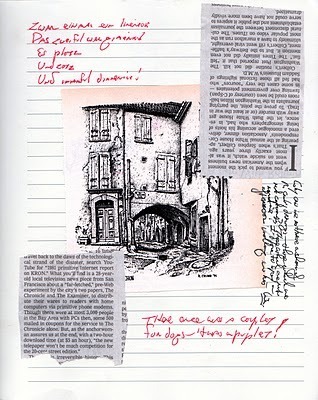
To begin, a nonsense limerick in bad Platdeutsch:
Zwar einmal ein limerick
Das zweifal war gimmerick
Es plotz
Und zotz
Und immerfal dimmerick!
Then an article about Stephen Colbert and the dwindling of traditional news nedia, superimposed over a gorgeous drawing by R. Crumb. What an eye that guy has! How very hard he works! Next to it I wrote: Why can we not have a show of R. Crumb drawings -- those which are not cartoons? Those which are not narrative? I'd love to spend an afternoon wallowing in his line.
Finally, another piece of light verse.
There once was a couplet for dogs -- 'twas a puplet!
*

To begin, a nonsense limerick in bad Platdeutsch:
Zwar einmal ein limerick
Das zweifal war gimmerick
Es plotz
Und zotz
Und immerfal dimmerick!
Then an article about Stephen Colbert and the dwindling of traditional news nedia, superimposed over a gorgeous drawing by R. Crumb. What an eye that guy has! How very hard he works! Next to it I wrote: Why can we not have a show of R. Crumb drawings -- those which are not cartoons? Those which are not narrative? I'd love to spend an afternoon wallowing in his line.
Finally, another piece of light verse.
There once was a couplet for dogs -- 'twas a puplet!
*
Published on August 05, 2011 00:12
August 4, 2011
Telling Lies for Fun and Profit
.
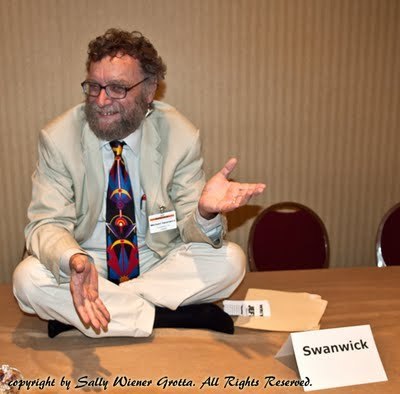
I'm a professional liar. It's not an easy skill to master, but it's one I take very seriously. So I'm always on the lookout for ways of telling lies more effectively.
I picked up a copy of the Fiction 2011 issue of the Atlantic yesterday, and in it found two true statements about my craft. The first, from an essay about the writer's fear of saying what has already been said by John Barth (whose Giles Goat-Boy was, many, many decades ago, the first big-and-difficult book I ever read) is a quote from Andre Gide:
The second comes from an essay by Bret Anthony Johnson titled Don't Write What You Know . Which, I must confess, had me at the title. Here's what he wrote:
Which is just brilliant. The critic Hugh Kenner once wrote an essay describing an incident in WWII wherein two agents of the French Resistance were sent on an important mission. Given an absolute minimum of information, in case they were caught, and disguised as tramps, they made their way across the perilous countryside. Only to discover at their dangerously open rendezvous point that their contact had been delayed but that, surely, Mr. Godot would be there tomorrow. This, he said, was in all likelihood the story that Samuel Beckett started with, before scraping off the particulars and making Waiting for Godot universal.
And rather to my surprise . . .
My own Stations of the Tide made NPR's list of the 217 best science fiction and fantasy books ever written. Actually, they're compiling a list of the top 100 but that won't be announced for a few weeks yet. And since my novel may fall off the list between then and now, I'm celebrating while I can.
Life is uncertain. Not long ago a food writer for the Philadelphia Inquirer wrote of how his mother had died of a heart attack one day while making lunch. He noted proudly that the piece of cake a neighbor had given her for dessert had already been eaten.
You can read about the list here. Or you can go straight to the list itself here.
Above: This quite good photo of me telling lies is copyright 2011 by Sally Wiener Gotta and is used here by kind permission of the photographer.

I'm a professional liar. It's not an easy skill to master, but it's one I take very seriously. So I'm always on the lookout for ways of telling lies more effectively.
I picked up a copy of the Fiction 2011 issue of the Atlantic yesterday, and in it found two true statements about my craft. The first, from an essay about the writer's fear of saying what has already been said by John Barth (whose Giles Goat-Boy was, many, many decades ago, the first big-and-difficult book I ever read) is a quote from Andre Gide:
Everything that needs to be said has already been said. But since no one was listening, everything must be said again.
The second comes from an essay by Bret Anthony Johnson titled Don't Write What You Know . Which, I must confess, had me at the title. Here's what he wrote:
Instead of thinking of my experiences as structures I wanted to erect in fiction, I started conceiving of them as the scaffolding that would be torn down once the work was complete.
Which is just brilliant. The critic Hugh Kenner once wrote an essay describing an incident in WWII wherein two agents of the French Resistance were sent on an important mission. Given an absolute minimum of information, in case they were caught, and disguised as tramps, they made their way across the perilous countryside. Only to discover at their dangerously open rendezvous point that their contact had been delayed but that, surely, Mr. Godot would be there tomorrow. This, he said, was in all likelihood the story that Samuel Beckett started with, before scraping off the particulars and making Waiting for Godot universal.
And rather to my surprise . . .
My own Stations of the Tide made NPR's list of the 217 best science fiction and fantasy books ever written. Actually, they're compiling a list of the top 100 but that won't be announced for a few weeks yet. And since my novel may fall off the list between then and now, I'm celebrating while I can.
Life is uncertain. Not long ago a food writer for the Philadelphia Inquirer wrote of how his mother had died of a heart attack one day while making lunch. He noted proudly that the piece of cake a neighbor had given her for dessert had already been eaten.
You can read about the list here. Or you can go straight to the list itself here.
Above: This quite good photo of me telling lies is copyright 2011 by Sally Wiener Gotta and is used here by kind permission of the photographer.
Published on August 04, 2011 07:19
Scribbledehobbledehoyden: The Magpie's Eye: Page 151
.
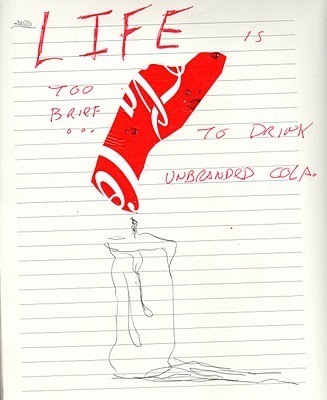
A candle, a flame made from a scrap of label from a certain cola, and a slogan suggested by one used to sell expensive wine.
I think this is self-explanatory.
*

A candle, a flame made from a scrap of label from a certain cola, and a slogan suggested by one used to sell expensive wine.
I think this is self-explanatory.
*
Published on August 04, 2011 00:09
August 3, 2011
Another Bookstore Bites the Dust
.

Sometimes it seems like I've spent my entire life watching bookstores close. I came to Philadelphia in the winter of 1973 to discover that a landmark bookstore (I thought it was Leary's, but Wikipedia tells me that closed in '69) was giving away all its books free just prior to closing its doors forever. For a time, my favorite bookstore was Middle Earth Books, but the owner finally had to shut it down and go into business rehabbing houses. For years, Hourglass Books was the focus of the science fiction community in Philadelphia. But then Fred Fisher concluded that he could do better things with his life than run an SF bookstore. There was a great little bookstore on Main Street in Manayunk, where I discovered Amos Tutuola's fiction. It didn't last.
And so it's gone.
I dropped by the Borders in Bryn Mawr today to buy a couple of books and witness the beginning of the end. This store closing is particularly painful because between them the Borders and Barnes & Noble chain put the vast majority of independent bookstore in this country out of business. And now, for reasons Marx mapped out over a century ago, the one has imploded and the other isn't looking very healthy.
Every time a bookstore closes, it feels like a friend has died. I came home feeling unhappy and a little angry at impersonal forces that are beyond anybody's control. The only consolation I have is that the chain didn't die because of anything I did.
God knows I spent enough money there over the years.
*

Sometimes it seems like I've spent my entire life watching bookstores close. I came to Philadelphia in the winter of 1973 to discover that a landmark bookstore (I thought it was Leary's, but Wikipedia tells me that closed in '69) was giving away all its books free just prior to closing its doors forever. For a time, my favorite bookstore was Middle Earth Books, but the owner finally had to shut it down and go into business rehabbing houses. For years, Hourglass Books was the focus of the science fiction community in Philadelphia. But then Fred Fisher concluded that he could do better things with his life than run an SF bookstore. There was a great little bookstore on Main Street in Manayunk, where I discovered Amos Tutuola's fiction. It didn't last.
And so it's gone.
I dropped by the Borders in Bryn Mawr today to buy a couple of books and witness the beginning of the end. This store closing is particularly painful because between them the Borders and Barnes & Noble chain put the vast majority of independent bookstore in this country out of business. And now, for reasons Marx mapped out over a century ago, the one has imploded and the other isn't looking very healthy.
Every time a bookstore closes, it feels like a friend has died. I came home feeling unhappy and a little angry at impersonal forces that are beyond anybody's control. The only consolation I have is that the chain didn't die because of anything I did.
God knows I spent enough money there over the years.
*
Published on August 03, 2011 13:34
Scribbledehobbledehoyden: The Magpie's Eye: Page 150
.
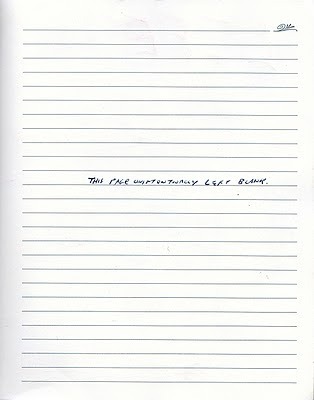
This one reads: This page unintentionally left blank.
It might help to remember that I write on the right-hand pages first, and save the left-hand pages for supplemental thoughts, So yesterday's page was a commentary on this one.
*

This one reads: This page unintentionally left blank.
It might help to remember that I write on the right-hand pages first, and save the left-hand pages for supplemental thoughts, So yesterday's page was a commentary on this one.
*
Published on August 03, 2011 00:05
August 2, 2011
Coming Soon to an Inter-Tubes Near YOU!
.
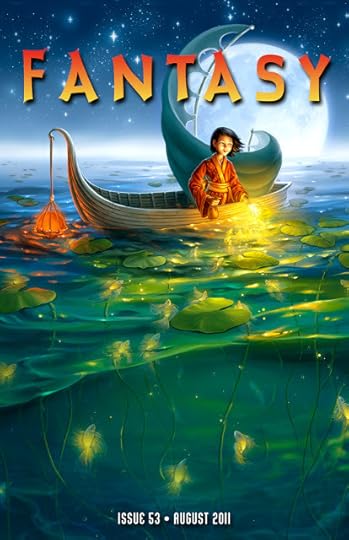
I'm in e-print again!
Well, almost.
First things first. Brand-new up is a podcast of my story Ancient Engines at Drabblecast. "Ancient Engines" is a particular favorite of mine because it's based on a a story that my late father-in-law used to tell on himself, about going to view a locomotive in a science museum. It lost the Hugo and Nebula Awards and the Locus Poll as well. But it won the Asimov's Readers Poll, so all in all it did pretty well by me.
You can find Drabblecast here. Or you can go straight to the story here.
My other piece of e-news is that the story which won me my first major award (a Sturgeon), The Edge of the World , is scheduled to be re-e-printed (if that's actually a word) in Fantasy Magazine on August 22. Or you can buy the entire issue in downloadable format for just $3.99.
All of which can be seen or done here.
Above: A very nice cover for Fantasy Magazine. But you already figured that one out.
*

I'm in e-print again!
Well, almost.
First things first. Brand-new up is a podcast of my story Ancient Engines at Drabblecast. "Ancient Engines" is a particular favorite of mine because it's based on a a story that my late father-in-law used to tell on himself, about going to view a locomotive in a science museum. It lost the Hugo and Nebula Awards and the Locus Poll as well. But it won the Asimov's Readers Poll, so all in all it did pretty well by me.
You can find Drabblecast here. Or you can go straight to the story here.
My other piece of e-news is that the story which won me my first major award (a Sturgeon), The Edge of the World , is scheduled to be re-e-printed (if that's actually a word) in Fantasy Magazine on August 22. Or you can buy the entire issue in downloadable format for just $3.99.
All of which can be seen or done here.
Above: A very nice cover for Fantasy Magazine. But you already figured that one out.
*
Published on August 02, 2011 08:27
Scribbledehobbledehoyden: The Magpie's Eye: Page 149
Published on August 02, 2011 01:58
August 1, 2011
Scribbledehobbledehoyden: The Magpie's Eye: Page 148
Published on August 01, 2011 01:55
The Weird Art of Christiaan Zwanikken
.
Maybe it's just as well I lost my notes.
I went to Jinxed Gallery on Friday to see the new Christiaan Zwanikken exhitbiion and, quite frankly, I loved it a lot. Zwanikken is a Dutch kinetic sculptor who combines robotics and (often) dead animal parts to create sculptures that are dark poems made physical. As you can see above, they're a little bit Goth, a little bit steampunk, a little bit influenced by Survival Research Labs.
I liked pretty much everything on display. I scribbled down the (rather long) titles. And somehow, rather mysteriously, every scrib of those notes disappeared into the black hole of my notebook. I just can't find them.
In one sense, it's a pity because Zwanikken's titles are clearly meaningful. The talking hare pictured in yesterday's blog had a title something like "A Dead Rabbit Head Explains Art." Which was a response to "How to Explain Art to a Dead Rabbit Head," a piece of performance art by Joseph Beuys. So, yeah, I'm definitely missing out on something here.
On the other hand, look at the video above. Or the one below of two ram's skulls. They work better freed of verbal expectation, dreamlike, afloat in their own wordless mythic realm.
Tomorrow, almost certainly, I'll write about the piece of his which really hit home for me.
*
Maybe it's just as well I lost my notes.
I went to Jinxed Gallery on Friday to see the new Christiaan Zwanikken exhitbiion and, quite frankly, I loved it a lot. Zwanikken is a Dutch kinetic sculptor who combines robotics and (often) dead animal parts to create sculptures that are dark poems made physical. As you can see above, they're a little bit Goth, a little bit steampunk, a little bit influenced by Survival Research Labs.
I liked pretty much everything on display. I scribbled down the (rather long) titles. And somehow, rather mysteriously, every scrib of those notes disappeared into the black hole of my notebook. I just can't find them.
In one sense, it's a pity because Zwanikken's titles are clearly meaningful. The talking hare pictured in yesterday's blog had a title something like "A Dead Rabbit Head Explains Art." Which was a response to "How to Explain Art to a Dead Rabbit Head," a piece of performance art by Joseph Beuys. So, yeah, I'm definitely missing out on something here.
On the other hand, look at the video above. Or the one below of two ram's skulls. They work better freed of verbal expectation, dreamlike, afloat in their own wordless mythic realm.
Tomorrow, almost certainly, I'll write about the piece of his which really hit home for me.
*
Published on August 01, 2011 01:06
Michael Swanwick's Blog
- Michael Swanwick's profile
- 546 followers
Michael Swanwick isn't a Goodreads Author
(yet),
but they
do have a blog,
so here are some recent posts imported from
their feed.


